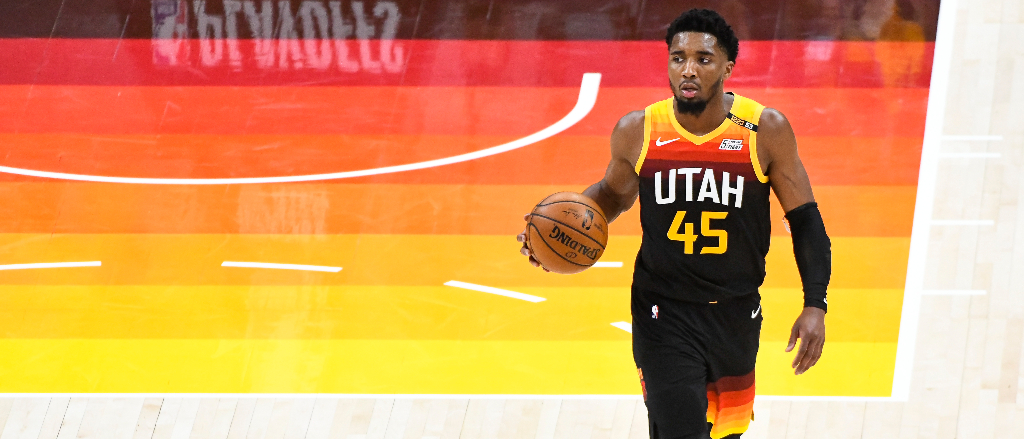Many NBA idiosyncrasies intersect at Donovan Mitchell: geography, drama, style. After yet another delightful postseason performance this week to open the Jazz’s second-round series against the Clippers in Salt Lake City, Mitchell stands among a select few with a reasonable claim to being a next face of the league. He plays a delirious brand of basketball carved from the changes the sport has undergone in recent years and is one of the most marketable personalities who boasts a wonderful nickname — Spida — to go with his All-Star caliber play.
Already among the active players with the highest per-game scoring average in the playoffs after 29 career postseason games, even the great Magic Johnson praised Mitchell in a rare comprehensible tweet this week.
Donovan Mitchell is a bonafide superstar, scoring 45 points in Game 1 and 37 points in Game 2! We have to start mentioning his name more with the KDs, LeBrons, Stephs, etc.
— Earvin Magic Johnson (@MagicJohnson) June 11, 2021
Greatness is clearly staring us right in the face when it comes to Mitchell, but a few things seem to be holding him back right now. A game reliant upon unreal pull-up three-point shooting and a flair for the dangerous make it feel as if the bottom could fall out at any time, even if dozens of games into his playoff career, Mitchell’s track record makes that seem very unlikely.
There’s also the Utah of it all — never has the NBA had anything resembling a face of the league who played for the Jazz. Karl Malone was far from charismatic, and nobody on the Deron Williams teams ever grew to that stature (nor were they ever as good as Mitchell’s Jazz are). Even among Mitchell’s teammates, Rudy Gobert stands as one of the most oft-mocked superstars we have, both for COVID reasons and the struggles defense-first players have from a marketability standpoint.
But every single time Mitchell steps foot onto a big stage, he puts on a show. Though there’s still a way to go against the Clippers, Mitchell has averaged at least 29 points per game in each of his last three playoff series. When the Jazz stopped him from playing Game 1 against Memphis, his competitiveness was enough to inspire a bunch of hush-hush stuff across the NBA media for days. It’s pretty intoxicating.
On top of that, if you’re looking for reasons to like Mitchell as a player, he undeniably has made the most of his time in the league. He arrived as an undersized late-lottery pick whose competitiveness was about the best thing you could say about him. As he grew as a player, Mitchell took advantage of the space inherent in the modern game to become an even better version of himself. After shooting just 29 percent on pull-up triples as a rookie, he made it a point to get better at this element of the game and tallied 36 percent on more than five attempts per game this season.
And as he built out his game, the Jazz put together a system with so much space and smarts that he has all the room he wants to freelance. Those decisions sometimes get him into trouble (though even his turnovers have dwindled), and all of it together has turned Mitchell into one of the most dazzling performers in the playoffs, a player who could potentially be great enough to lead Utah’s offense on a title run this year.
Of course, there’s also the upside of existing in an NBA town like Salt Lake. As the young Black superstar in a place known in NBA circles for not always being particularly hospitable to opposing players, Mitchell holds fascinating influence. He wielded it in the first round when, after Ja Morant’s family was subject to some of that Utah ugliness, Mitchell met courtside with Ja’s father, Tee.
Tee Morant, Ja Morant’s father, wants Utah to win the title after how the Jazz dealt with fans that made racist and vulgar remarks at members of the Morant family.
(🎥: @espn_macmahon)pic.twitter.com/wo9P9JZUD7
— theScore (@theScore) June 3, 2021
Across multiple games this postseason, we’ve watched a public friendship blossom between Mitchell and new Jazz co-owner Dwyane Wade. As the cofounder of the Social Justice Fund, a tireless supporter of his daughter, Zaya, and an outspoken advocate of disenfranchised groups across America, Wade is an intriguing mentor for Mitchell — not to mention the young Jazz standout has been compared stylistically to Wade since his Louisville days.
Should Mitchell, from his perch in Utah, continue to embrace the mantle of all that it means to be an outspoken champion of racial equity and genuine brotherhood with the rest of the NBA, it will give his career another thick layer of meaning in the broader conversation around the league. Mitchell could be crucial to how the NBA exists culturally for years to come.
This month, we’ll watch another early chapter play out. The league may not know it could use a character like Mitchell at its forefront, but he is asserting himself through all the ways an NBA star can, and he seems to be thinking bigger and bigger. At this point, who are we to doubt him?







